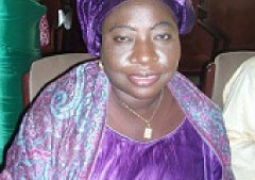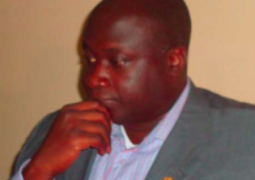Over 200 representatives convened on October 21st, at the WEC Mission Camp in Kampant, Western Region for a 2-day workshop to reinforce dialogue between ex-circumcisers and practising circumcisers and their assistants for an accelerated total abandonment of female genital mutilation/cutting (FGM/C) in the Gambia. The workshop, which was organized by the Foundation for Research on Women's Health, Productivity, and the Environment (BAFROW), supported by UNFPA, timely coincided with the 4th Annual Congress of BAFROW's Association of Ex-circumcisers. Coming from around the country, a number of partners attended the ceremony, among which included Members of the Association of Ex- circumcisors, practising circumcisers and their assistants, BAFROW health promoters and health mobilizers, members of the coalition against FGM/C, members of BAFROW's Board of Directors, the Women's Bureau, network of journalists, community leaders, women's leaders, and religious leaders.
Following a march pass by members of the Association to start off the meeting, the Director of BAFROW, Ms. Fatou Waggeh, in her Welcoming Remarks expressed BAFROW's heartfelt appreciation of UNFPA's support. Ms. Waggeh assured UNFPA that BAFROW will do its best to "make good use of the support to achieve [its] goals." The Director appealed to practising circumcisers and their assistants to seize this opportunity to listen to and learn from the workshop. She also encouraged the Association members to use the workshop time to discuss ways of enhancing the Association and its interventions. Ms. Waggeh especially emphasized the importance of active participation by the assistants of practising circumcisers as they tend to become successors in the trade. "It is therefore vital," she stated "that they have a very good understanding of the health and human rights aspects of FGM/C for behaviour change."
Delivering the Opening Statement, the UNFPA Country Representative, Dr. Ruben Mboge, expressed his delight at being able to be a part of the activity which, like all BAFROW's interventions, promote women and children's health and rights, and improve their standard of living. Dr. Mboge conveys UNFPA's continued support to BAFROW?s FGM/C abandonment/prevention programmes, especially in the areas of capacity building for FGM/C prevention, and medical care and treatment for women and girls affected by the cutting. Dr. Mboge maintained that interventions at community level are essential for FGM/C prevention, and called on other advocates and partners to promote the establishment of more associations such as BAFROW's Association of Ex-Circumcisers to help address the issue at grass root. Finally, Dr. Mboge advised members of the Association to use their time together to reflect hard on how to surpass the challenges awaiting them in their quest to sensitize, and ultimately convert, more practising circumcisers.
Speaking on behalf of the Association of Ex-circumcisers, the President, Mansata Ceesay of Laminkoto Village Central River Region, shared some of the Association?s experiences and achievements with the participants. She divulged the doubt and fear experienced by members of the association during the establishment of the Association in 1998. "As an ex-circumciser, I know that the practice of FGM/C is sacred in many cultures; it is a way of life. Several times, while we worked on strengthening the mission and vision of our Association, we asked ourselves how on earth we were going to succeed in convincing communities to stop the cutting." However, Mansata Ceesay explained that by transforming circumcisers into health mobilizers through intensive training course and skills upgrading they were able to create landmarks in the fight against FGM/C in the Gambia.
Mansata Ceesay explained that one of their major breakthroughs in the history of anti-FGM campaign in the Gambia is the restructuring of the rite of passage for girls, which advocates for the sustenance of positive past and current ceremonial practices associated with the practice of FGM/C without the cutting. "Society does not exist in a vacuum," she explained. "It is built within a framework of values that are identified with norms, cultures and traditions which are developed and sustained by people to give them their identity. Culture and tradition have the capacity to maintain peaceful co-existence among people but some traditions can also destroy its people. Since the dynamism of culture can make space for change and adjustment, any successful change is determined by the approaches used in dealing with the issue. It is within this context, she expounded, that BAFROW and the Association of Ex-Circumcisers addressed the issue of FGM/C within the framework of a restructured passage rite for girls. The concept of the restructured rite of passage has gained the love, respect and appreciation of many families and communities. This is why today," she added, "we are proud to report that over 10,000 girls have been registered into the restructured rite of passage, and over 500 communities that have not conducted FGM/C in the past ten years. "I never would have believed that this Association would get this far, or that we would experience and see the things we have seen," she disclosed. Mansata Ceesay thanked all the communities which now embrace the alternative rite of passage, and encouraged others to follow their good example.
Spokespersons from Berefet Village (Foni Berefet, WR), Lamin Koto (CRR), and Mandinaba (WR), which were one of the first communities to accept "Initiation Without Mutilation/Cutting," explained the education process that they went through and which brought about behaviour and attitudinal change in their communities. Fatou Jamana Sayang and Jainaba Kolley of Berefet explained that BAFROW's model is based on a holistic/integrated approach which ensures peoples participation and ownership. Through their sensitization and functional literacy program, which they started in 2001, their community has been empowered to take charge in auditing their own systems and practices as citizens in relation to an identified problem which they want to address. Training courses such as sexual and reproductive health information, environmental health, anti-FGM/C related advocacy skills, HIV/AIDS prevention, women and girls? rights, economic empowerment, and the linkages between these issues helped to enhance their understanding that FGM/C is a hazard to women?s health and impinges on their reproductive health rights.
"For the past 8 years, FGM/C has not been conducted in our village," said one of the spokespersons. "To ensure that our children are not cut elsewhere, we see to it that they do not go on holiday to practising villages by themselves. We are very happy with our children." She urged participants to follow in the footsteps of Berefet Village and teach their children the true values of tradition, culture and religion without exposing them to pain and suffering. Bakoto Keita and Yoro Jallow of LaminKoto, whose children were registered and went through the restructured rites of passage, shared their experience.
According to Bakoto, whose elder daughter went through the traditional passage rite ceremony while their younger daughter went to BAFROW's camp, there are significant differences between BAFROW's camp and the traditional camp. Bakoto pointed out as an example how their younger daughter came back with more knowledge and was better behaved than when the elder daughter came back from the tradition camp a few years earlier.
Giving an overview of the Association's annual report, the 1st Vice President of the Association, Fatoumatta Mballow of Ndemban Village, read a statement she had written herself in Mandinka on the background of the Association and its members. In 1995, during the early days of BAFROW's FGM/C programme, 15 circumcisers from different areas of the country decided to stop the cutting after taking part in BAFROW's community sensitizations and learning of the repercussions of the cutting in terms of health and human rights. These women were brought together by BAFROW and educated through BAFROW's Functional Literacy Programme on reproductive health and women's rights issues. To preserve their status in community, they were trained as health promoters and advocates for the abandonment of FGM/C with special attention given to their Communication and Lobbying skills for an efficient transmission of information for the promotion of behaviour change.
To help the ex-circumcisers support themselves and their families financially with an alternative source of income, BAFROW later on provided them with lifeskills such as sewing, baking, tie-dye, and soap-making through its Better Life (Baluu Niima) project. With focus on converting more practising circumcisers, members of the Association have since embarked on annual countrywide sensitization tours accompanied by representatives from BAFROW women's groups, men's groups, youth groups, health promoters, and religious scholars. Moreover, the Association monitors the rate at which FGM/C is being abandoned around the country, what new strategies are being used, and offer advice and counselling services to people in their communities whenever necessary.
Fatoumatta Mballow went on to share some of their achievements which include:
- Increasing the membership of the association from 15 - 178 within 11 years
- Work with over 300 communities to develop strategies for the abandonment of FGMC
- Retraining and transformation of 150 circumcisers, including potential circumcisers, into health mobilizers through intensive training course, and skills upgrading workshops organized yearly
- Developed a Curriculum for an alternative rite of passage for girls excluding FGM/C
- Trained 50 ex-circumcisers on the use of the Curriculum
- Establishment of The "Baluu Niima" (Better Life) microcredit and economic empowerment project for 50 ex-circumcisers and their communities
- Registered over 500 communities where the practice of FGM/C has not been done for the past 10 years
- Set up child welfare programs in communities to monitor children at risk of FGM/C from birth to eight years old while their parents receive information and education on Reproductive health and rights
- Planted over 10,000 trees as a demonstration of families' commitment to register their children into the alternative rite of passage
- Celebration of alternative rite of passage for 200 girls from six villages among other achievements
Fatoumatta Mballow finally invited the general public to visit some of their projects and communities and share their best practices.
At the end of the second day, a spokesperson for 34 of the participating circumcisers and their assistants still practicing FGM/C declared "We will no longer put our daughters, our sisters, our mothers in pain and danger. We will not help them die during delivery, or see them weep silently throughout their lives. We will put our knives down to promote women's health and hope that others will follow in our footstep and contribute towards significantly improving our nation?s health and standard of living."
The Director of BAFROW closed the workshop by urging members of the Association to go back to their respective villages and act on the actions drawn up during the workshop. She encouraged the new converts to build up their knowledge on issues of FGM/C and learn from the Association. Ms. Waggeh finally assured them of BAFROW's continued support and wished them luck in the further interventions.



